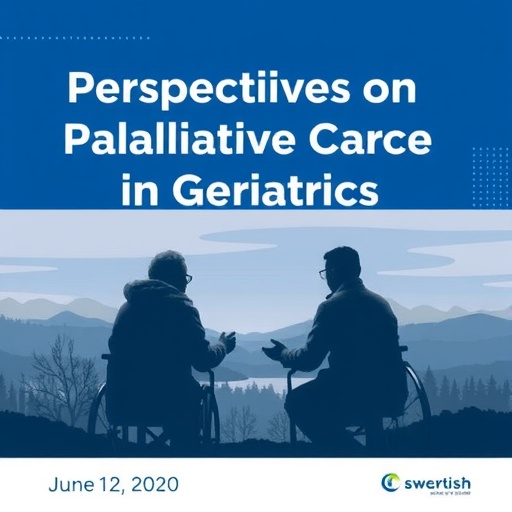In recent years, the integration of palliative care within geriatric settings has gained increasing importance, highlighting the need for clear and effective guidelines that can be actively implemented by healthcare professionals. A recent qualitative study, conducted by Möllerberg and colleagues, delves into the perspectives of various healthcare professionals regarding the adoption of the Swedish palliative care guide in geriatrics. This innovative research sheds light on the nuances of healthcare delivery in this vital area and emphasizes how such frameworks can be adapted in real-world clinical environments.
Geriatric care uniquely intersects with palliative care due to the complex needs of older patients who often suffer from multiple chronic illnesses. Ensuring that these patients receive compassionate and effective care requires a multidisciplinary approach. The findings from the study reveal that healthcare professionals recognize the significance of the Swedish palliative care guide as a crucial tool for enhancing the quality of life of elderly patients. Their insights were obtained through both small-group discussions and individual interviews, allowing for a deep exploration of their attitudes and experiences.
The healthcare professionals involved in the study expressed varying levels of familiarity with the palliative care guide, illustrating a critical gap in knowledge that can influence the quality of care provided to patients. Some reported feeling confident in their abilities to apply the guide, while others indicated that further training and resources would enhance their understanding. Notably, this variability in knowledge underscores the necessity for ongoing education and support for healthcare workers in geriatric settings.
Moreover, the study highlighted the emotional and ethical dimensions that influence healthcare professionals’ willingness to implement the palliative care guide in their practice. Many participants reflected on the importance of compassionate communication and shared decision-making with patients and families. The need for a framework that fosters these interactions was emphasized, as it can significantly impact patients’ experiences and their overall trajectory of care.
Additionally, the research revealed institutional barriers that healthcare professionals face when trying to implement the guide. These obstacles can range from administrative challenges to lack of resources, which ultimately hinder the integration of palliative care practices in geriatrics. Professionals voiced concerns over insufficient staffing and inadequate support, elucidating the systemic issues that can impede effective patient-centered care.
Interestingly, the study’s findings also suggest that collaboration among healthcare teams is a vital factor in successfully implementing the palliative care guide. Participants cited the benefits of interdisciplinary approaches where different healthcare disciplines can share their expertise and support one another. Such collaboration not only encourages a comprehensive understanding of palliative needs but also cultivates an environment where best practices can emerge.
Additionally, the cultural context surrounding palliative care was a significant point of discussion among the professionals. Variations in cultural attitudes towards end-of-life care can influence both patient expectations and healthcare provider practices. The study indicates that healthcare professionals must be aware of these cultural dynamics in order to provide care that is not only appropriate but also resonates with the values and beliefs of their patients.
The study also identified the role of policy in shaping the landscape of palliative care in geriatrics. Participants acknowledged that policies at the institutional and national levels greatly influence the resources available for support and training. Advocating for policy changes that prioritize palliative care integration into geriatrics could be a catalyst for improving care delivery and enabling healthcare systems to better meet the needs of older adults.
As the medical field continues to evolve, the study illuminates the need for ongoing research that evaluates the effectiveness of palliative care frameworks in clinical practice. By understanding the barriers and facilitators to implementation, future studies can develop targeted interventions that address specific challenges faced by healthcare professionals. This ongoing cycle of research, implementation, and evaluation is essential for cultivating a culture of excellence in geriatric palliative care.
Moreover, by amplifying the voices of healthcare professionals in this process, it becomes possible to create more nuanced and effective guidelines that truly reflect the realities of geriatric care. Continuous feedback loops between providers and researchers can ensure that the tools developed are practical, relevant, and ultimately beneficial for patient outcomes.
In conclusion, Möllerberg et al.’s qualitative study represents a significant contribution to the understanding of palliative care in geriatric settings. The insights garnered from healthcare professionals provide a foundation upon which future training, policies, and research can build. By prioritizing these perspectives, the integration of palliative care into geriatrics can be improved, leading to enhanced patient experiences and outcomes for one of society’s most vulnerable populations.
As healthcare systems worldwide grapple with the challenges of an aging population, the importance of effective palliative care cannot be overstated. At the core of this endeavor is the need to listen to the healthcare professionals who are on the front lines, ensuring that they feel equipped, supported, and empowered to provide the best possible care for elderly patients.
Subject of Research: Perspectives of healthcare professionals on implementing the Swedish palliative care guide in geriatrics.
Article Title: Healthcare professionals’ perspectives on implementing the Swedish palliative care guide in geriatrics – a qualitative study using small-group and individual interviews.
Article References:
Möllerberg, ML., Dalhammar, K., Rasmussen, B.H. et al. Healthcare professionals’ perspectives on implementing the Swedish palliative care guide in geriatrics – a qualitative study using small-group and individual interviews.
BMC Geriatr 25, 839 (2025). https://doi.org/10.1186/s12877-025-06516-1
Image Credits: AI Generated
DOI: https://doi.org/10.1186/s12877-025-06516-1
Keywords: Palliative Care, Geriatrics, Healthcare Professionals, Implementation, Qualitative Study.




